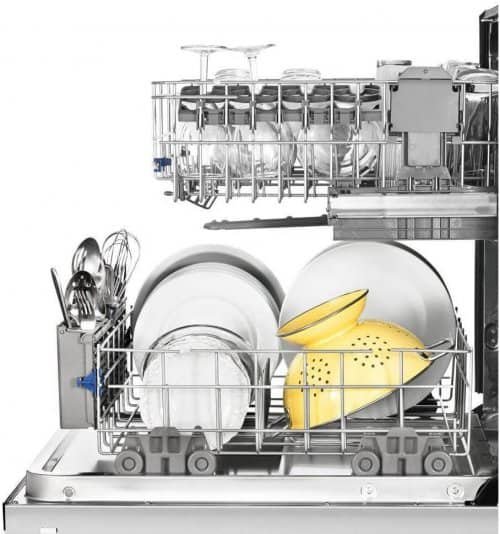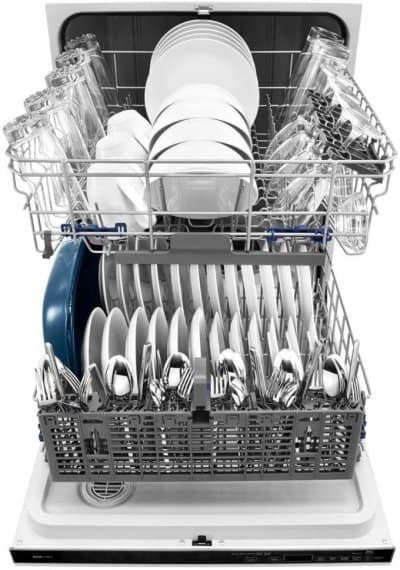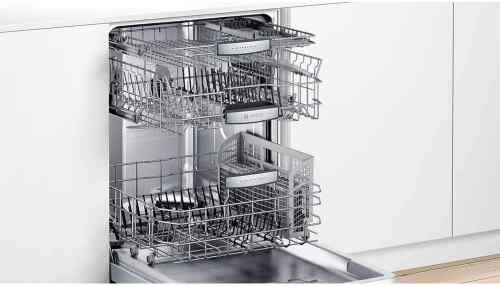Table of Contents
Dish Soap in the Dishwasher: Why It’s a Big No-No
Dishwashers have become a ubiquitous appliance in modern kitchens, making the arduous task of hand-washing dishes a thing of the past. However, a common question that often arises is whether using regular dish soap in the dishwasher is acceptable. In this blog post, we will delve into the topic and provide insights into whether using dish soap in the dishwasher is a viable option or a potential disaster waiting to happen.

Understanding Dishwashers and Dish Soap
Before we dive into the debate, it’s essential to understand the fundamental differences between regular dish soap and dishwasher detergent. Dishwasher detergent is specifically formulated to work effectively within the dishwasher’s mechanical and chemical processes. It’s designed to break down food particles, grease, and stains while preventing excess sudsing that could potentially damage the dishwasher.

On the other hand, regular dish soap, designed for hand-washing, tends to create a significant amount of suds when agitated. These suds can lead to an overflow of bubbles within the dishwasher, causing leaks, and potentially damaging the machine’s internal components.
The Downsides of Using Dish Soap in the Dishwasher
Using regular dish soap in a dishwasher can have several negative consequences:
- Excess Suds: The primary issue with using dish soap in the dishwasher is the excessive creation of suds. As the dishwasher agitates water and dishes, these suds can build up rapidly and lead to leaks or even a flood in your kitchen.
- Poor Cleaning Performance: Regular dish soap may not effectively break down food particles and stains as dishwasher detergent does. This can result in less-than-clean dishes and the need for additional rinses.
- Potential Damage to Dishwasher: The suds generated by regular dish soap can clog pumps, filters, and other internal components of the dishwasher. Over time, this can lead to reduced efficiency and potentially expensive repairs.
- Warranty Voiding: Most dishwasher warranties specifically state that using non-approved detergents, including regular dish soap, can void the warranty. This means any repairs or replacements that arise due to such use may not be covered by the manufacturer.

Alternatives to Dish Soap in the Dishwasher
If you find yourself without dishwasher detergent, there are a few alternatives to consider:
- Baking Soda: Baking soda can be used as a cleaning agent in the dishwasher. It helps to remove odors, stains, and grease without creating excessive suds.
- Vinegar: White vinegar can act as a natural rinse aid and help eliminate spots and streaks on glassware and dishes.
- Commercial Dishwasher Detergent Substitutes: In a pinch, you can use commercial dishwasher detergent substitutes that are specifically formulated to be low-sudsing and safe for dishwashers.

Why You Shouldn’t Use Dish Soap in The Dishwasher?
Using dish soap in the dishwasher is not recommended for a few reasons. Firstly, dish soap is designed to create suds and foam, which can cause excessive bubbling in the dishwasher. This can lead to leaks or overflow, potentially damaging your dishwasher and kitchen floor. Additionally, dish soap is formulated differently than dishwasher detergent. Dishwasher detergents are specifically designed to break down food particles and grease, while also being gentle on your dishes and dishwasher. Using dish soap can result in residue and film on your dishes, as well as clogging up the dishwasher’s filters and spray arms.

Furthermore, using dish soap in the dishwasher may void any warranty you have on your appliance. Manufacturers typically specify that only approved dishwasher detergents should be used to maintain the optimal performance of the machine. In case of any issues or repairs needed, using unauthorized products like dish soap may make it difficult to claim warranty coverage.
In conclusion, it is best to stick with using proper dishwasher detergent for your machine. This will ensure that your dishes come out clean and spotless without causing any damage or voiding warranties.
What to do if you put Dish Soap in the Dishwasher?
If you accidentally put dish soap in the dishwasher instead of dishwasher detergent, there are a few steps you can take to rectify the situation. First, stop the dishwasher immediately to prevent any further damage. Next, remove as much of the excess dish soap as possible by scooping it out or using a wet cloth. Be careful not to spread it around and ensure that no soap remains in the dishwasher.
Once you have removed the excess soap, run a rinse cycle on your dishwasher without any dishes or detergent. This will help to flush out any remaining soap residue. You may need to repeat this step multiple times until all traces of dish soap are gone. After completing the rinse cycles, you can resume normal use of your dishwasher with the appropriate dishwasher detergent. It’s important to remember that using dish soap in your dishwasher can cause excessive sudsing and potentially damage your machine, so it’s best to be cautious and always double-check before adding anything into your dishwasher.
What happens if you put Dish Soap in the Dishwasher?
If you put dish soap in the dishwasher instead of dishwasher detergent, it can cause a lot of problems. Dish soap creates a lot of suds, which can overflow and leak out of the dishwasher. This can lead to a messy kitchen and potentially damage your floors or cabinets. Additionally, the excess suds can prevent the dishwasher from properly cleaning your dishes, as they may not be able to move around freely in the soapy water.
Furthermore, using dish soap in the dishwasher can also damage the machine itself. The high amount of suds can create pressure that may cause pipes or hoses to burst. It can also clog up filters and other components, leading to poor performance or even breakdowns. Therefore, it’s important to always use dishwasher detergent specifically designed for use in dishwashers to ensure proper cleaning and maintenance of your machine.
How to Clean up After Putting Dish Soap in The Dishwasher?
If you accidentally put dish soap in the dishwasher instead of dishwasher detergent, don’t panic! There are a few steps you can take to clean up the mess. First, stop the dishwasher immediately and open it up. Remove any dishes or utensils that have been affected by the dish soap.

Next, grab a large container or bucket and fill it with cold water. Use this water to rinse out as much of the soap as possible from the dishwasher. You may need to repeat this step several times until all traces of soap are gone.
Once you have rinsed out most of the soap, sprinkle a generous amount of white vinegar inside the dishwasher. This will help neutralize any remaining soap residue and eliminate any lingering odors. After letting the vinegar sit for a few minutes, run a short cycle using hot water to thoroughly rinse out the dishwasher.
In conclusion, cleaning up after putting dish soap in the dishwasher is not as daunting as it may seem. By following these steps and being thorough in rinsing out the soap, you can quickly get your dishwasher back to its normal functioning state. Remember to always double-check your detergent before adding it to avoid future mishaps!

What Can You Use If You Run Out of Dishwasher Soap?
If you run out of dishwasher soap, there are a few alternatives you can use to still get your dishes clean. One option is to use regular liquid dish soap. However, it’s important to note that you should only use a small amount as regular dish soap tends to produce more suds than dishwasher soap. Using too much can cause excessive suds and potentially lead to a messy overflow in your dishwasher.
Another alternative is using baking soda. Baking soda is known for its cleaning properties and can be effective in removing grease and stains from dishes. Simply sprinkle some baking soda onto the bottom of your dishwasher before running a cycle. However, keep in mind that this method may not be as effective at tackling tough stains or baked-on food particles compared to specialized dishwasher soap.
Overall, while these alternatives can work in a pinch, it’s always best to have proper dishwasher soap on hand for optimal cleaning results and to protect the longevity of your dishwasher.

Conclusion
In conclusion, using regular dish soap in the dishwasher is not recommended due to the potential for excess suds, poor cleaning performance, potential damage to the dishwasher, and voiding of warranties. It’s always best to use dishwasher detergent that is formulated to work effectively within the appliance’s design. If you run out of dishwasher detergent, consider using alternatives like baking soda, vinegar, or low-sudsing dishwasher detergent substitutes to ensure that your dishwasher continues to operate efficiently and effectively.

